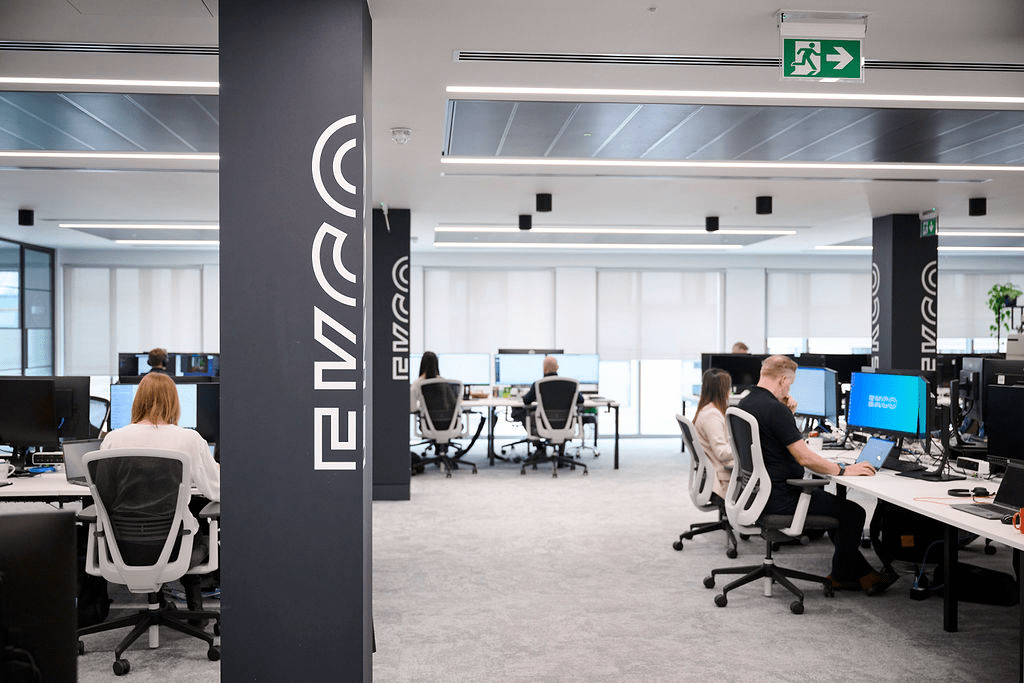How to choose the right SOC as a Service provider for your business
For many organisations, partnering with the right SOC as a Service provider means having a robust, scalable and responsive security framework.

For many organisations, partnering with the right SOC as a Service provider means having a robust, scalable and responsive security framework.
However, there are plenty of SOCaaS providers on the market, all with different benefits and ways of working that need to align with your cyber security goals and business needs.
So, how do you select one?
This guide walks you through the essential criteria, features and considerations for choosing an effective SOC as a Service provider. Organisations heavily invested in the Microsoft ecosystem should specifically look for providers with deep expertise in securing Microsoft environments.
Why are businesses opting for SOC as a Service providers?
The rise of digital threats has pushed organisations to re-evaluate how they manage their security operations strategy. SOCaaS has become a popular choice by enabling businesses to outsource the complex and resource-intensive task of cyber security to specialised providers.
By partnering with SOCaaS providers, companies gain access to an elite team of security professionals, advanced technology, and continuous monitoring—all without the cost and logistical challenges of establishing an in-house SOC.
In short, the key reasons business’ are going for SOCaaS providers are:
- Scalability: SOCaaS providers offer scalable solutions that adapt as your business grows.
- 24/7 Monitoring: Real-time alerts and 24/7 monitoring ensure threats are addressed promptly. Look for solutions that integrate seamlessly with Microsoft Azure and Microsoft 365 for comprehensive visibility.
- Cost Efficiency: Outsourcing security operations reduces the need for in-house experts and infrastructure.
- Access to Advanced Threat Intelligence: SOCaaS providers bring industry-specific expertise and cutting-edge tools.
The core services offered by SOCaaS providers
When considering SOC as a Service providers, it’s essential to understand the core services they typically provide. Here are some key services you should look for:
Continuous Monitoring and Alerting: Top SOCaaS providers offer continuous monitoring, using tools like SIEM (Security Information and Event Management) systems to detect unusual behaviours. Real-time alerts keep you informed of potential security incidents before they escalate.
Threat Detection and Response: Effective SOCaaS providers use threat intelligence and machine learning algorithms to detect advanced threats. A quick response from your provider means they’ll take action to contain the threat and prevent further damage. Some businesses may prefer to opt for an MDR or similar solution here, but this will always depend on the level of metection and response your organisation needs.
Incident Management and Remediation: Having a SOC as a Service provider ensures that you have a structured incident response plan in place. This includes root cause analysis and detailed reporting, helping you strengthen your defences against future threats.
Compliance Management: Meeting industry regulations is a complex and time-consuming task. Many SOCaaS providers offer support with GDPR, ISO 27001, and other compliance requirements, ensuring your business stays compliant and secure.
Threat Intelligence: Top-tier SOCaaS providers enrich security operations with proactive threat intelligence. This allows for predictive defence, identifying emerging risks even before they reach your infrastructure.
For organisations standardising on Microsoft security solutions, ensure the SOCaaS provider offers specialised expertise in managing and optimizing those tools, such as Microsoft Defender, Azure Sentinel and Microsoft Purview.
What to look for when choosing SOC as a service providers
Selecting the right SOC as a Service provider involves a close examination of their offerings, reputation, and compatibility with your organisation’s unique needs. Here are the main factors to consider:
Security expertise and industry knowledge
Security is complex and nuanced, and not all SOCaaS providers are created equal. Look for a provider with proven expertise in your industry. For example, Ekco, a trusted name in security services, brings domain-specific knowledge that makes a difference in response effectiveness and industry-tailored security measures.
Technology and infrastructure
Modern SOCaaS providers should offer a robust technology stack that includes:
- SIEM Tools: An advanced SIEM system is critical for logging and analysing security data.
- Automation: Automated workflows and machine learning-driven insights reduce the need for manual monitoring and enable rapid incident responses.
- Integration Capabilities: The SOCaaS provider should seamlessly integrate with your existing infrastructure to enhance the value of your security investments.
Scalability and flexibility
Your security needs will evolve as your business grows. Select SOC as a Service providers that offer flexible, scalable solutions, adapting to shifts in your organisation’s size and structure. Some businesses may prefer the scalability an MDR solution; however, this choice ultimately depends on your specific business needs and security goals, as well as the level of hands-on control you require.
Compliance support
Navigating complex regulatory requirements is challenging without dedicated resources. SOCaaS providers with compliance support ensure your business stays aligned with critical data protection laws, helping mitigate risks associated with non-compliance.
Transparent reporting and communication
Clear, frequent communication is essential for any successful security partnership. Opt for a SOC as a Service provider that offers regular updates, detailed reports, and transparent metrics. Providers with dedicated customer success teams, like Ekco, stand out by offering in-depth reporting and actionable insights tailored to your operations.
Client reviews and case studies
Evaluating client testimonials, case studies, and independent reviews can provide valuable insight into a provider’s track record. Case studies show how SOCaaS providers have successfully handled security challenges for businesses similar to yours.
Questions to ask potential SOCaaS providers
To gauge the fit of potential SOC as a Service providers, consider these critical questions:
- How do you customise your services to fit different industry needs?
- What security certifications do you hold?
- How do you handle incident response and remediation?
- What level of access will I have to real-time monitoring and reports?
- Can your services integrate with our existing infrastructure?
- What is your approach to compliance management?
Types of SOCaaS providers: in-house, co-managed and fully managed
Understanding the different types of SOCaaS providers can help you decide which model aligns best with your needs.
- In-House SOC: This option involves building and managing a SOC internally. While it offers complete control, it’s costly and resource-intensive, especially for SMEs.
- Co-Managed SOCaaS: In this model, your team works alongside a SOCaaS provider, sharing responsibilities. Co-managed options give you control over certain operations, with the benefit of external support.
- Fully Managed SOCaaS: The fully managed SOCaaS provider model is ideal for organisations seeking a hands-off approach, where the provider manages every aspect of security operations.
Challenges to overcome with SOC as a service provider
Selecting the right SOC as a Service (SOCaaS) provider is what will ultimately make or break your cyber security.
This is due to the challenges that come with partnering with an external provider, which must be addressed to ensure effective collaboration and protection.
Here are key issues to consider and ways to overcome them:
Limited control over security operations
Working with external SOCaaS providers means relinquishing some level of control over daily security functions. To address this, select a provider that offers co-managed services, allowing you to retain control over essential areas.
Data privacy concerns
When engaging a SOCaaS provider, you’ll need to share sensitive data. Ensure the provider has robust data privacy practices, including encrypted storage and restricted access protocols.
Managing false positives
SOCaaS providers often deal with massive data volumes, and false positives can occur. To avoid alert fatigue, choose a provider that uses advanced machine learning to reduce the number of false alerts, focusing your attention on genuine threats.
The future of SOCaaS: key trends to watch
The SOCaaS industry continues to evolve, incorporating innovations that enhance threat detection and streamline security management. Some trends to watch include:
- AI-Driven Threat Detection: Leveraging artificial intelligence and machine learning to improve the accuracy of threat detection.
- Cloud-Native SOCs: With more businesses shifting to the cloud, SOCaaS providers are moving toward cloud-native operations for better scalability.
- Zero Trust Architecture: Many SOCaaS providers are integrating Zero Trust models, which enhance security by verifying every access attempt.
- Greater Emphasis on Proactive Security: Future-focused SOCaaS providers will focus on preemptively identifying and neutralising threats, minimising the need for reactive responses.
Why partner with Ekco as Your SOCaaS provider?
Ekco’s approach to SOC as a Service stands out with a commitment to tailored security solutions and proactive threat detection. With deep industry knowledge and a customer-focused approach, Ekco helps businesses stay one step ahead of cyber threats and can help businesses to ensure that their Microsoft security investments are well protected. Whether you need a fully managed SOC solution or a co-managed partnership, Ekco’s SOC services ensure comprehensive protection with transparency and expert support.

Question?
Our specialists have the answer
